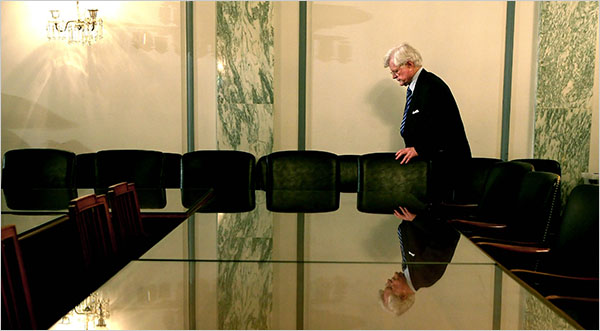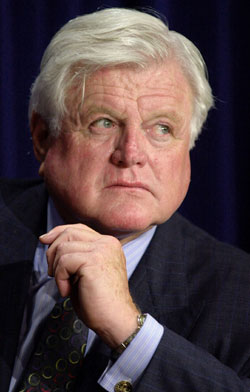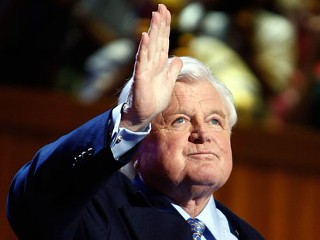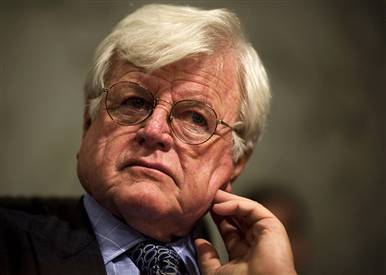Teddy Kennedy Dead at 77
Senator Edward M. Kennedy died last night, aged 77, succumbing to brain cancer.
Edward Kennedy, Senate Stalwart, Dies (John Broder, NYT)
Senator Edward M. Kennedy of Massachusetts, a son of one of the most storied families in American politics, a man who knew triumph and tragedy in near-equal measure and who will be remembered as one of the most effective lawmakers in the history of the Senate, died late Tuesday night. He was 77.
The death of Mr. Kennedy, who had been battling brain cancer, was announced Wednesday morning in a statement by the Kennedy family, which was already mourning the death of the senator’s sister Eunice Kennedy Shriver two weeks earlier.
“Edward M. Kennedy — the husband, father, grandfather, brother and uncle we loved so deeply — died late Tuesday night at home in Hyannis Port,” the statement said. “We’ve lost the irreplaceable center of our family and joyous light in our lives, but the inspiration of his faith, optimism, and perseverance will live on in our hearts forever.”
“An important chapter in our history has come to an end,” President Obama said in a statement. “Our country has lost a great leader, who picked up the torch of his fallen brothers and became the greatest United States senator of our time.”
Mr. Kennedy had been in precarious health since he suffered a seizure in May 2008. His doctors determined the cause had been a malignant glioma, a brain tumor that often carries a grim prognosis.
As he underwent cancer treatment, Mr. Kennedy was little seen in Washington, appearing most recently at the White House in April as Mr. Obama signed a national service bill that bears the Kennedy name. Last week Mr. Kennedy urged Massachusetts lawmakers to change state law and let Gov. Deval Patrick appoint a temporary replacement upon his death, to assure that the state’s representation in Congress would not be interrupted by a special election.
While Mr. Kennedy had been physically absent from the capital in recent months, his presence had been deeply felt as Congress weighed the most sweeping revisions to America’s health care system in decades, an effort Mr. Kennedy called “the cause of my life.”
Massachusetts Sen. Ted Kennedy Dies at 77 After Cancer Battle (Joe Holley, WaPo)
Edward M. Kennedy, one of the most powerful and influential senators in American history and one of three brothers whose political triumphs and personal tragedies captivated the nation for decades, died late Tuesday at his home in Hyannis Port, Mass., at age 77. He had been battling brain cancer.
His family announced his death in a brief statement released early Wednesday. “We’ve lost the irreplaceable center of our family and joyous light in our lives, but the inspiration of his faith, optimism, and perseverance will live on in our hearts forever,” the statement said. “We thank everyone who gave him care and support over this last year, and everyone who stood with him for so many years in his tireless march for progress toward justice, fairness and opportunity for all.”
President Obama released a statement Wednesday morning, pointing out that “virtually every major piece of legislation to advance the civil rights, health and economic well being of the American people bore his name and resulted from his efforts. . . . Our country has lost a great leader, who picked up the torch of his fallen brothers and became the greatest United States Senator of our time. . . . Our hearts and prayers go out to” the Kennedy family.
Kennedy, a Massachusetts Democrat, was the last male survivor of a privileged and charismatic family that in the 1960s dominated American politics and attracted worldwide attention. His sister, Special Olympics founder Eunice Kennedy Shriver, died two weeks ago, also in Hyannis Port. One sibling, former U.S. ambassador to Ireland Jean Kennedy Smith, is still alive.
As heir through tragedy to his accomplished older brothers — President John F. Kennedy and Sen. Robert F. Kennedy (D-N.Y.), both of whom were assassinated — Edward Kennedy became the patriarch of his clan and a towering figure in the U.S. Senate to a degree neither of his siblings had been.
Kennedy served in the Senate through five of the most dramatic decades of the nation’s history. He became a lawmaker whose legislative accomplishments, political authority and gift for friendship across the political spectrum invited favorable comparisons to Daniel Webster, Henry Clay and a handful of other leviathans of the country’s most elite political body. But he was also beset by personal frailties and family misfortunes that were the stuff of tabloid headlines.
For years, many Democrats considered Kennedy’s own presidency a virtual inevitability. In 1968, a “Draft Ted” campaign emerged only a few months after Robert Kennedy’s death, but he demurred, realizing he was not prepared to be president.
Political observers considered him the candidate to beat in 1972, but that possibility came to an end on a night in July 1969, when the senator drove his Oldsmobile off a bridge on Chappaquiddick Island, Mass., and a young female passenger, Mary Jo Kopechne, drowned. The tragedy had a corrosive effect on Kennedy’s image, eroding his national standing. He made a dismal showing when he challenged President Jimmy Carter for reelection in 1980. But the moment of his exit from the presidential stage marked an oratorical highlight when, speaking at the Democratic National Convention, he invoked his brothers and promised: “For all those whose cares have been our concern, the work goes on. The cause endures, the hope still lives and the dream shall never die.”
Kennedy dead at 77 (Martin Nolan, Boston Globe)
Senator Edward M. Kennedy, who carried aloft the torch of a Massachusetts dynasty and a liberal ideology to the citadel of Senate power, but whose personal and political failings may have prevented him from realizing the ultimate prize of the presidency, died at his home in Hyannis Port last night after a battle with brain cancer. He was 77.
“We’ve lost the irreplaceable center of our family and joyous light in our lives, but the inspiration of his faith, optimism, and perseverance will live on in our hearts forever,” his family said in a statement. “We thank everyone who gave him care and support over this last year, and everyone who stood with him for so many years in his tireless march for progress toward justice, fairness, and opportunity for all. He loved this country and devoted his life to serving it. He always believed that our best days were still ahead, but it’s hard to imagine any of them without him.”
Overcoming a history of family tragedy, including the assassinations of a brother who was president and another who sought the presidency, Senator Kennedy seized the role of being a “Senate man.” He became a Democratic titan of Washington who fought for the less fortunate, who crafted unlikely deals with conservative Republicans, and who ceaselessly sought support for universal health coverage.
“Teddy,” as he was known to intimates, constituents, and even his fiercest enemies, was an unwavering symbol to the left and the right – the former for his unapologetic embrace of liberalism, and latter for his value as a political target. But with his fiery rhetoric, his distinctive Massachusetts accent, and his role as representative of one of the nation’s best-known political families, he was widely recognized as an American original. In the end, some of those who might have been his harshest political enemies, including former President George W. Bush, found ways to collaborate with the man who was called the “last lion” of the Senate.
Senator Kennedy’s White House aspirations may have been doomed by his actions on the night he drove off a bridge at Chappaquiddick Island in 1969 and failed to promptly report the accident in which Mary Jo Kopechne, who had worked for his brother Robert, died. When Kennedy nonetheless later sought to wrest the presidential nomination from an incumbent Democrat, Jimmy Carter, he failed. But that failure prompted him to reevaluate his place in history, and he dedicated himself to fulfilling his political agenda by other means, famously saying, “the dream shall never die.”
Ted Kennedy Dies of Brain Cancer at Age 77 – ‘Liberal Lion’ of the Senate Led Storied Political Family After Deaths of President John F. Kennedy, Sen. Robert F. Kennedy (ABC)
Sen. Ted Kennedy died shortly before midnight Tuesday at his home in Hyannis Port, Mass., at age 77.
The man known as the “liberal lion of the Senate” had fought a more than year-long battle with brain cancer, and according to his son had lived longer with the disease than his doctors expected him to.
“We’ve lost the irreplaceable center of our family and joyous light in our lives, but the inspiration of his faith, optimism, and perseverance will live on in our hearts forever,” the Kennedy family said in a statement. “He loved this country and devoted his life to serving it.”
Sen. Edward Moore Kennedy, the youngest Kennedy brother who was left to head the family’s political dynasty after his brothers President John F. Kennedy and Sen. Robert F. Kennedy were assassinated.
Kennedy championed health care reform, working wages and equal rights in his storied career. In August, he was awarded the Presidential Medal of Freedom — the nation’s highest civilian honor — by President Obama. His daughter, Kara Kennedy, accepted the award on his behalf.
U.S. Senator Ted Kennedy dies at 77 – Liberal lion loses yearlong battle with brain cancer at Massachusetts home (NBC News/wire)
Sen. Edward M. Kennedy, the liberal lion of the Senate and haunted bearer of the Camelot torch after two of his brothers fell to assassins’ bullets, has died at his home in Hyannis Port after battling a brain tumor. He was 77.
For nearly a half-century in the Senate, Kennedy was a steadfast champion of the working class and the poor, a powerful voice on health care, civil rights, and war and peace. To the American public, though, he was best known as the last surviving son of America’s most glamorous political family, the eulogist of a clan shattered again and again by tragedy.
[…]
Kennedy was elected to the Senate in 1962, when his brother John was president, and served longer than all but two senators in history. Over the decades, he put his imprint on every major piece of social legislation to clear the Congress.
His own hopes of reaching the White House were damaged — perhaps doomed — in 1969 by the scandal that came to be known as Chappaquiddick, an auto accident that left a young woman dead.
Kennedy — known to family, friends and foes simply as Ted — ended his quest for the presidency in 1980 with a stirring valedictory that echoed across the decades: “For all those whose cares have been our concern, the work goes on, the cause endures, the hope still lives and the dream shall never die.”
[…]
Nancy Reagan, the widow of President Ronald Reagan, was one of the first to speak out from the Republican Party.
“Given our political differences, people are sometimes surprised by how close Ronnie and I have been to the Kennedy family,” she said in a statement.
“But Ronnie and Ted could always find common ground, and they had great respect for one another. In recent years, Ted and I found our common ground in stem cell research, and I considered him an ally and a dear friend. I will miss him,” she said.
Republican California Gov. Arnold Schwarzenegger, whose wife, Maria Shriver, was Kennedy’s niece, praised “the rock of our family: a loving husband, father, brother and uncle.”
That the Chappaquiddick scandal didn’t make the first several paragraphs — or even first page — of several of these obits is quite remarkable. It would be like writing an obit for Richard Nixon that didn’t mention Watergate or one for Michael Jackson that glossed over repeated allegations of pedophilia.
That said, Kennedy was obviously much more than his actions on the worst night of his life. While he could be incredibly partisan, even vitriolically so on some issues, he was almost universally acknowledged even by opponents as an honorable negotiating partner and an outstanding legislator.
See my followup, “Mary Jo Kopechne.”





R.I.P., Mary Jo Kopechne (1940-1969)
Real classy, guys. Yech.
There’s a constant race to the bottom between conservatives and liberals about who can show the least class when a major figure from the opposing camp dies.
I was not a fan of Edward Kennedy and believe some of the agendas he espoused harmed the USA. I never wished him any political success.
That being said…
For all his faults and failings, Lord have mercy.
Amen.
My Jesus Mercy
the S.O.B.should have been put in prison for killing that mary jo girl at chippaquiddick i for one will not miss him and am glad he is dead i never wished him any success after leaving that girl to die in 1969 and hope he burns in hell for it.
jimbo:
I hope that, if there is a god, you find mercy in your heart before you finally die, lest you end up burning in hell where you may or may not find Mr. Kennedy.
So let’s see James, your own commentary spends the majority of two paragraphs talking about Mary Jo, and ends with the vaguest of compliments about his negotiating skills. But you aren’t being partisan. How many years of service? How many accomplishments (which you could even criticize) but all you mention is something that happened that had no connection to his service to his country (unlike NIxon’s impeachment) because it didn’t make the headline.
When Laura Bush dies, I wonder if you will write the same sort of comment – complaining that her killing of Michael Dutton Douglas by running a stop sign didn’t make the top of the story?
A Statesman at last!
I hope his faith has given substance to the promise of salvation through the Blood of Christ.
I’m not sure what’s partisan about it. It’s the incident which ensured his political advancement ended at Senator. It was the single most notable event in his life. I’m questioning why it wasn’t covered more prominently.
As to the Laura Bush comparison, it’s silly. Most people are unaware of the incident, which happened two days after her 17th birthday and in which no charges were filed nor any allegations of it being more than an accident existed contemporaneously.
Kennedy was a middle-aged man at the time of his accident and he behaved in manner that was, to say the least, quite peculiar.